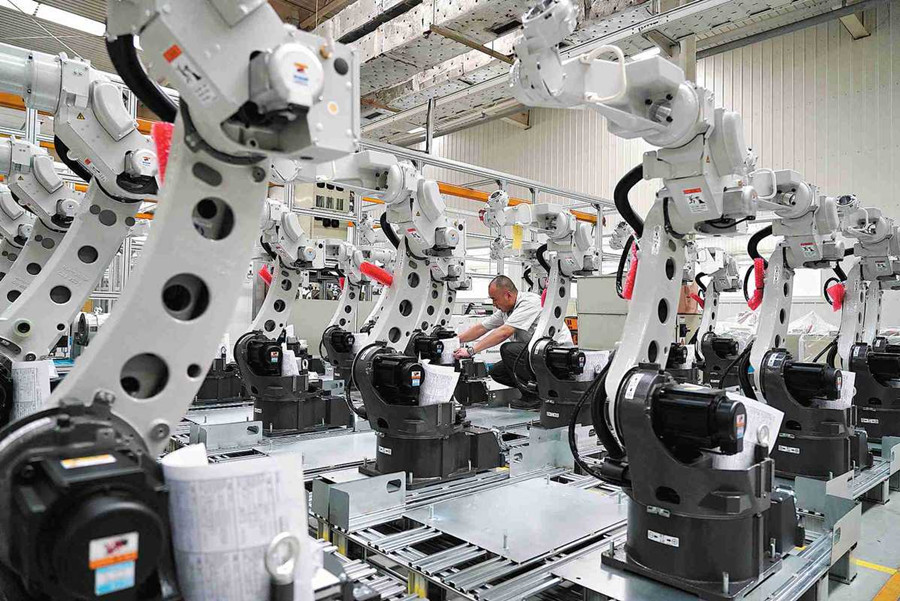Stress on industry seen lifting economy

An employee checks welding robots at a manufacturer in Tangshan, Hebei province. [Photo/Xinhua]
China's emphasis on developing the real economy and advancing new industrialization is expected to lay a solid foundation for long-term economic growth and boost the country's core competitiveness globally despite downward pressures and uncertainties both at home and abroad, experts said.
They also said as China is stepping up efforts to promote industrial upgrade, more efforts should be made to improve independent innovation capabilities, and accelerate in-depth integration of digital technologies with the real economy.
Their comments came after a report delivered at the opening session of the 20th National Congress of the Communist Party of China on Sunday stressed the need to modernize the industrial system, as part of the country's broader push to create a new development pattern and pursue high-quality development.
"In pursuing economic growth, we must continue to focus on the real economy. We will advance new industrialization and move faster to boost China's strength in manufacturing, product quality, aerospace, transportation, cyberspace and digital development," the report said.
China will move the manufacturing sector toward higher-end, smarter and greener production, it said.
Long Haibo, a senior researcher at the Development Research Center of the State Council, said: "The key to advancing new industrialization is to propel the higher-end, smarter and greener development of manufacturing industry, which plays a prominent role in bolstering high-quality development, and ensuring the security and stability of industrial and supply chains. China should further enhance the proportion of manufacturing output in the country's GDP."
Long said new-generation information technologies such as artificial intelligence, 5G, big data and the internet of things have found a wide range of applications in the advanced manufacturing and sped up integration with the real economy.
Efforts will be made to cultivate new growth engines such as next-generation information technology, artificial intelligence, biotechnology, new energy, new materials, high-end equipment and green industry, the report said.
China's manufacturing sector has maintained growth momentum amid challenges from the COVID-19 pandemic and a complicated external environment.
Data from the Ministry of Industry and Information Technology showed China accounted for nearly 30 percent of the global manufacturing output in 2021, up from 22.5 percent in 2012, and maintained its title as the world's largest manufacturing country.
Li Xianjun, an associate researcher from the Institute of Industrial Economics at the Chinese Academy of Social Sciences, said China's efforts to put development focus on the real economy and build up its strength in modern industrial system will help make the country's economy more resilient, strengthen the capacity to buffer against external risks and shocks, and build the country into a manufacturing powerhouse.
"The manufacturing industry, as the main body of China's real economy, is playing an increasingly crucial part in bolstering technological innovation, driving the development of other strategic emerging sectors, and enhancing the country's core competitiveness on the global stage," Li said.
Li Dongsheng, founder and chairman of Chinese consumer electronics company TCL Technology Group Corp, said China's resolve to develop its real economy and advance new industrialization sets the direction for the country's high-tech manufacturing and has created immense opportunities for growing business.
"Manufacturing is the foundation of the real economy, and enterprises, as key players bolstering innovation, should continue to unswervingly invest in high-tech manufacturing and expand their presence in the upstream of industrial chains," Li said.
He also said TCL will focus on strategic emerging industries like semiconductor displays, new energy, photovoltaic panels and materials used in the manufacture of semiconductors, and contribute to the high-quality development of the Chinese manufacturing sector.
The purpose of modernizing the industrial system is to ensure the long-term and sustainable growth of the Chinese economy, said Pan Helin, co-director of the Digital Economy and Financial Innovation Research Center at Zhejiang University's International Business School.
The country's real economy, he said, is expected to show greater vitality, fueled by technological innovation.
More efforts are needed to improve the technological innovation system, strengthen the protection of intellectual property rights to spur innovation, and optimize business environment to attract capital and technology inflows, Pan said.
Copyright © The National Committee of the Chinese People's Political Consultative Conference.
All rights reserved. Presented by China Daily.
京ICP备08100501号-1

